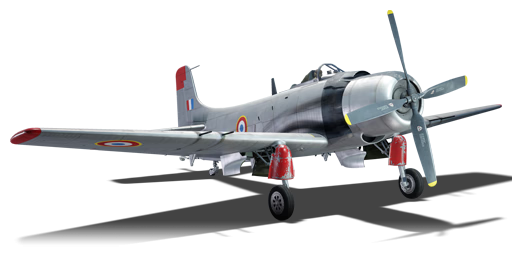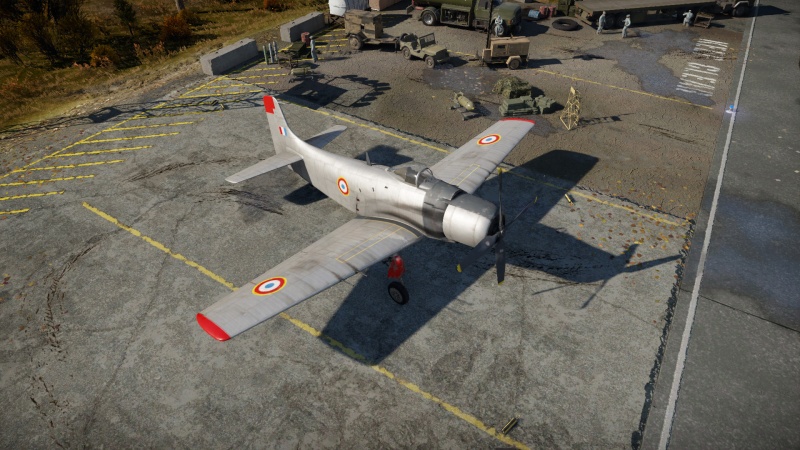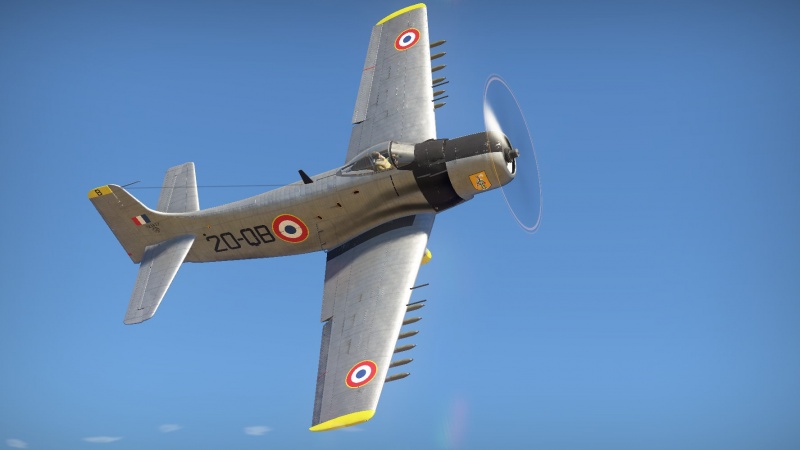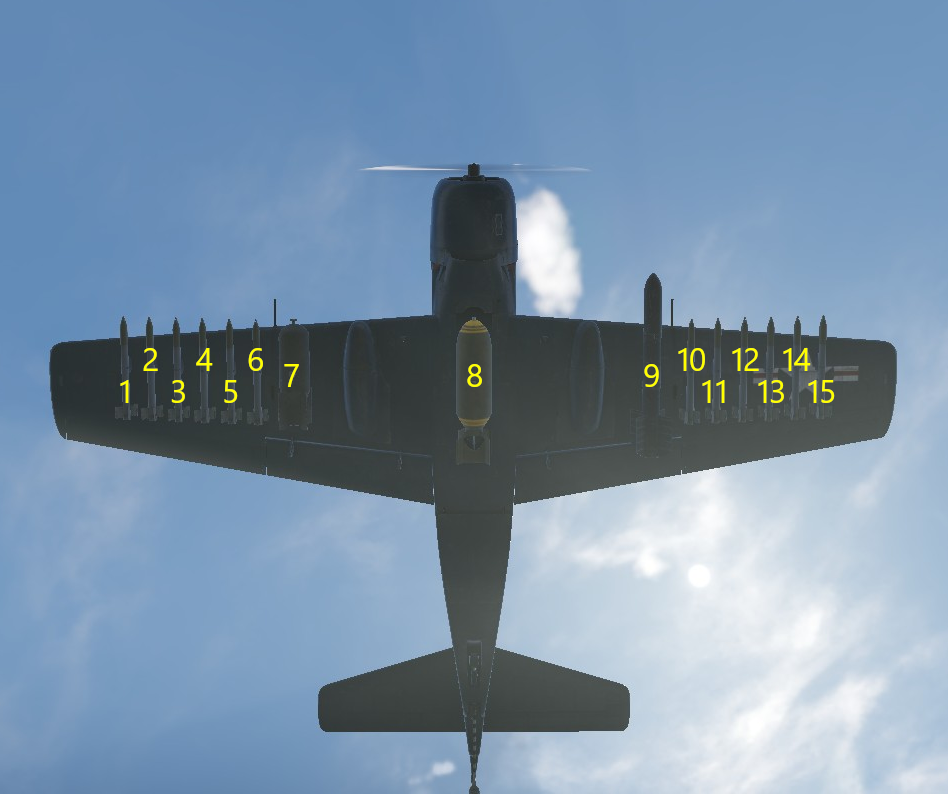Difference between revisions of "AD-4 (France)"
(→Suspended armament: Updated) |
(→Custom loadout options) |
||
| Line 142: | Line 142: | ||
|- | |- | ||
! T10 140 rockets | ! T10 140 rockets | ||
| − | | | + | | 2 || 2 || 2 || 2 || 2 || 2 || || || || 2 || 2 || 2 || 2 || 2 || 2 |
|- | |- | ||
! T10 151 rockets | ! T10 151 rockets | ||
| − | | | + | | 2 || 2 || 2 || 2 || 2 || 2 || || || || 2 || 2 || 2 || 2 || 2 || 2 |
|- | |- | ||
! Tiny Tim rockets | ! Tiny Tim rockets | ||
Revision as of 12:45, 11 January 2023
| This page is about the strike aircraft AD-4 (France). For other versions, see AD Skyraider (Family). |
Contents
Description
The ▄AD-4 Skyraider is a rank IV French strike aircraft with a battle rating of 5.3 (AB), 6.0 (RB), and 5.7 (SB). It was introduced in Update 1.73 "Vive la France".
General info
Flight performance
Considering the size, weight, and engine of the aircraft, the AD-4 still maintains a good top-end speed and gets there in a reasonable time, though nowhere as fast as comparable fighters get to theirs. Skyraider pilots will find their plane able pull a great instantaneous turn rate to keep up with fighters or other aircraft that end up on the business end of the AD-4's cannons, though their plane will very quickly lose a lot of speed thanks to its incredibly high weight. Sustained turns are not a strength of the AD-4 by any means, and the introduction of any verticality into manoeuvres will emphasis this weakness even further; the plane has rather terrible energy retention.
| Characteristics | Max Speed (km/h at 5,822 m) |
Max altitude (metres) |
Turn time (seconds) |
Rate of climb (metres/second) |
Take-off run (metres) | |||
|---|---|---|---|---|---|---|---|---|
| AB | RB | AB | RB | AB | RB | |||
| Stock | 557 | 543 | 8900 | 24.0 | 24.6 | 11.5 | 11.5 | 600 |
| Upgraded | 621 | 587 | 22.1 | 23.0 | 24.7 | 15.5 | ||
Details
| Features | ||||
|---|---|---|---|---|
| Combat flaps | Take-off flaps | Landing flaps | Air brakes | Arrestor gear |
| ✓ | ✓ | ✓ | ✓ | X |
| Limits | ||||||
|---|---|---|---|---|---|---|
| Wings (km/h) | Gear (km/h) | Flaps (km/h) | Max Static G | |||
| Combat | Take-off | Landing | + | - | ||
| 797 | 680 | 365 | 345 | 252 | ~12 | ~5 |
| Optimal velocities (km/h) | |||
|---|---|---|---|
| Ailerons | Rudder | Elevators | Radiator |
| < 460 | < 480 | < 410 | > 300 |
Survivability and armour
- 40 mm Bulletproof glass in front of the pilot.
- 9.5 mm Steel plates under the engine.
- 9.5 mm Steel plate behind pilot.
The AD-4 also has a single, large self-sealing fuel tank placed behind the pilot's steel plate. The oil cooling systems are found behind the engine, protected from ground fire by the same steel plates. Both of the steel plates are capable of preventing the penetration of HE shells. It is thick enough to block AP shells from 7.92 mm machine guns at longer ranges, and 7.62 mm machine guns at all but point-blank ranges, giving the AD-4's engine and pilot excellent survivability from rifle-calibre ground fire.
Modifications and economy
Armaments
Offensive armament
The AD-4 (France) is armed with:
- 4 x 20 mm M3 cannons, wing-mounted (200 rpg = 800 total)
The four cannons are arranged in bundles of two, mounted in each wing. Each has an ammunition load of 200 rounds, and all fire simultaneously. All cannons exhaust their ammunition supply at the same time.
The 20 mm M3 is an excellent all-rounder cannon, dealing consistently lethal damage to enemy aircraft with both API-T and HEF-I shells, but also being able to pierce lightly armoured tanks with API-T shells, which can penetrate 27 mm of RHA at 500 m, enough to deal with nearly every light tank the AD-4 will encounter. However, the M3's accuracy without the "New 20 mm cannons" modification is exceptionally poor, with hit probabilities outside 500-600 m becoming very low due to high bullet spread.
Suspended armament
The AD-4 (France) can be outfitted with the following ordnance presets:
- Without load
- 12 x HVAR rockets
- 2 x Tiny Tim rockets
- 24 x T10 140 rockets
- 24 x T10 151 rockets
- 2 x 250 lb AN-M57 bombs (500 lb total)
- 3 x 500 lb AN-M64A1 bombs (1,500 lb total)
- 3 x 1,000 lb AN-M65A1 bombs (3,000 lb total)
- 1 x 2,000 lb AN-M66A2 bomb (2,000 lb total)
- 1 x 2,216 lb Mk.13-6 Case torpedo
Custom loadout options
| 1 | 2 | 3 | 4 | 5 | 6 | 7 | 8 | 9 | 10 | 11 | 12 | 13 | 14 | 15 | ||
|---|---|---|---|---|---|---|---|---|---|---|---|---|---|---|---|---|
| 250 lb AN-M57 bombs | 1 | 1 | ||||||||||||||
| 500 lb AN-M64A1 bombs | 1 | 1 | 1 | |||||||||||||
| 1,000 lb AN-M65A1 bombs | 1 | 1 | 1 | |||||||||||||
| 2,000 lb AN-M66A2 bombs | 1 | |||||||||||||||
| HVAR rockets | 1 | 1 | 1 | 1 | 1 | 1 | 1 | 1 | 1 | 1 | 1 | 1 | ||||
| T10 140 rockets | 2 | 2 | 2 | 2 | 2 | 2 | 2 | 2 | 2 | 2 | 2 | 2 | ||||
| T10 151 rockets | 2 | 2 | 2 | 2 | 2 | 2 | 2 | 2 | 2 | 2 | 2 | 2 | ||||
| Tiny Tim rockets | 1 | 1 | ||||||||||||||
| 2,216 lb Mk.13-6 Case torpedoes | 1 |
Usage in battles
The AD-4 is a well-suited aircraft for its primary role — ground attack — and provides the pilot with a large variety of highly effective payload options for dealing with different types of targets. Depending on the pilot's preference, the French AD-4 has access to over twenty options for suspended armaments, consisting mostly of different types of bomb/rocket hybrid payloads.
There are three primary rocket selections available to the French AD-4; twelve HVAR rockets, twenty-four T10 151 AP rockets, and twenty-four T10 140 HE rockets. Each rocket type can be used with the full range of hybrid payloads, which includes a Mk.13-1 Case torpedo, two Tiny Tim rockets, or a selection of bomb set-ups including 2,000 lb bombs, 1,000 lb bombs, 500 lb bombs, or combinations of the three as listed above. Your choices will vary based on your expected target type and game mode. T10 T151 rockets plus two Tiny Tims, for instance, may be the best option for dealing with enemy anti-air in ground.
The AD-4's biggest enemy is opposing fighter planes. The Skyraider is a massive, heavy, and difficult to manoeuvre target, and enemy fighters will have no trouble sticking to one like glue. AD-4 pilots will need to take this into consideration when entering the combat area. The AD-4 is quite survivable, so it can take head-ons in spite of its wing-mounted guns, and deal considerable damage with the AN/M3s, though it may often be better to wait for friendly fighter cover or retreat immediately to allied anti-air once the threat of enemy air arises.
Manual Engine Control
| MEC elements | ||||||
|---|---|---|---|---|---|---|
| Mixer | Pitch | Radiator | Supercharger | Turbocharger | ||
| Oil | Water | Type | ||||
| Controllable | Controllable Auto control available |
Controllable Auto control available |
Controllable Auto control available |
Separate | Controllable 2 gears |
Not controllable |
Pros and cons
Pros:
- Large variety of suspended armament options
- Four 20 mm AN/M3 cannons, effective against all lightly armoured target types
- Survivable against low calibre (7.62 mm to 7.96 mm) ground fire
- Surprisingly high instantaneous turn rate
- Has air brakes
Cons:
- High weight, even when unladen, but especially with suspended armaments
- Loses energy fast in manoeuvres, laden or unladen with suspended armament
- Has a chance of encountering late-WWII/1940s jet aircraft
- Large difference between stock and spaded flight/gun performance
- No tail hook for carrier landings, unlike the American naval AD-4
History
The AD-4 is part of a long line of piston-engined attack aircraft developed by the Douglas Aircraft Company, starting with the A-1 Skyraider, seeing service across the globe in various ground strike roles. The variant of the French AD-4 represented in War Thunder is the French AD-4NA, a variant of the formerly three-seated AD-4N night attack plane which was converted to a single-seated attacker in American Service before being sold to France, though France did also come into possession of the AD-4N.
Having notably served during the Korean War under the USN and USAF, the Skyraider attracted many potential buyers including France who acquired 40 AD-4NA and 53 AD-4N aircraft from the US Navy Surplus in 1959. The Skyraider saw service in France's Armée de l'Air starting in 1960, during the Algerian War being sent against the Front de Libération Nationale, a movement fighting for the independence of Algeria from French rule. When the country gained independence in 1962, the AD-4 was relegated to service in Djibouti, then called the French Territory of Afars and the Issas. The French AD-4s last saw combat in Chad, where the French used them to support the government against Islamic guerilla forces in the area.
These French AD-4s were subsequently sold onwards to other countries such as Cambodia and Chad, where they saw further use under those flags.[1]
Media
- Skins
- Videos
See also
- Aircraft of comparable role, configuration, and era
External links
References
- ↑ Francillon, René J. McDonnell Douglas Aircraft since 1920. London: Putnam, 1979. ISBN 0-370-00050-1.
| Douglas Aircraft Company | |
|---|---|
| Strike Aircraft | A-20G-25 · A-26B-10 · A-26B-50 · AD-2 · AD-4 · A-1H |
| Bombers | TBD-1 · B-18A · SBD-3 · BTD-1 · A-26C-45 · A-26C-45DT |
| Turboprops | A2D-1 |
| Jet Aircraft | F3D-1 · F4D-1 |
| A-4 Skyhawk | A-4B · A-4E Early |
| Export | ▄Havoc Mk I · ▄Boston Mk I · ▄DB-7 · ▂A-20G-30 · ▄AD-4 · ▄AD-4NA |
| A-4 Skyhawk | A-4H · A-4E Early (M) · Ayit · A-4E |
| The Douglas Aircraft Company merged with McDonnell Aircraft Corporation in 1967 to form McDonnell Douglas. | |
| France twin-engine fighters and strike aircraft | |
|---|---|
| Twin-engine fighters | Potez 630 · Potez 631 · VB.10C-1 · VB.10-02 |
| Strike aircraft | Br.693AB2 · ▄AD-4 · ▄AD-4NA |
| Netherlands | |
| Twin-engine fighters | ◗Fokker G.IA |
| Strike aircraft | ◘Firefly F.Mk.IV |







